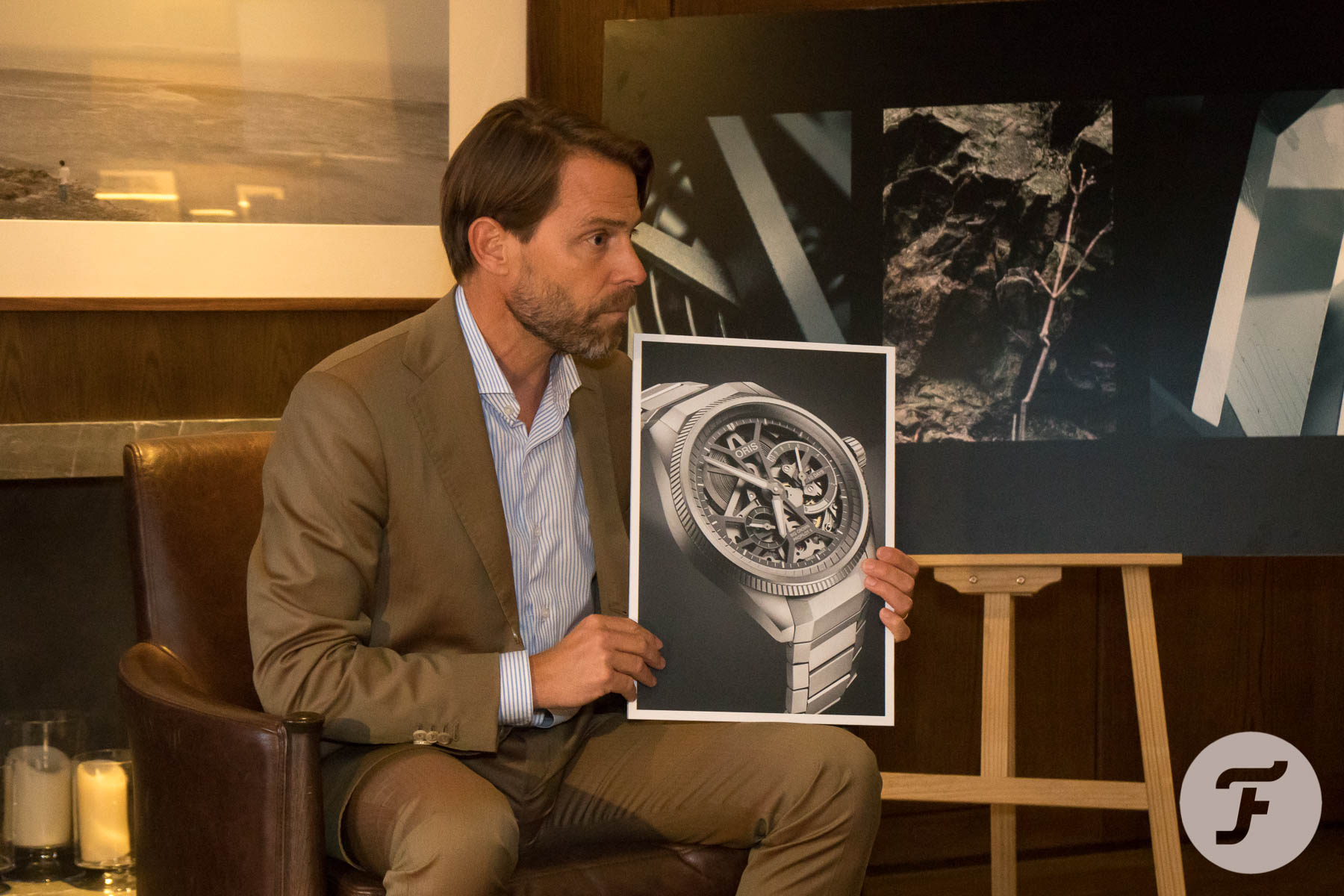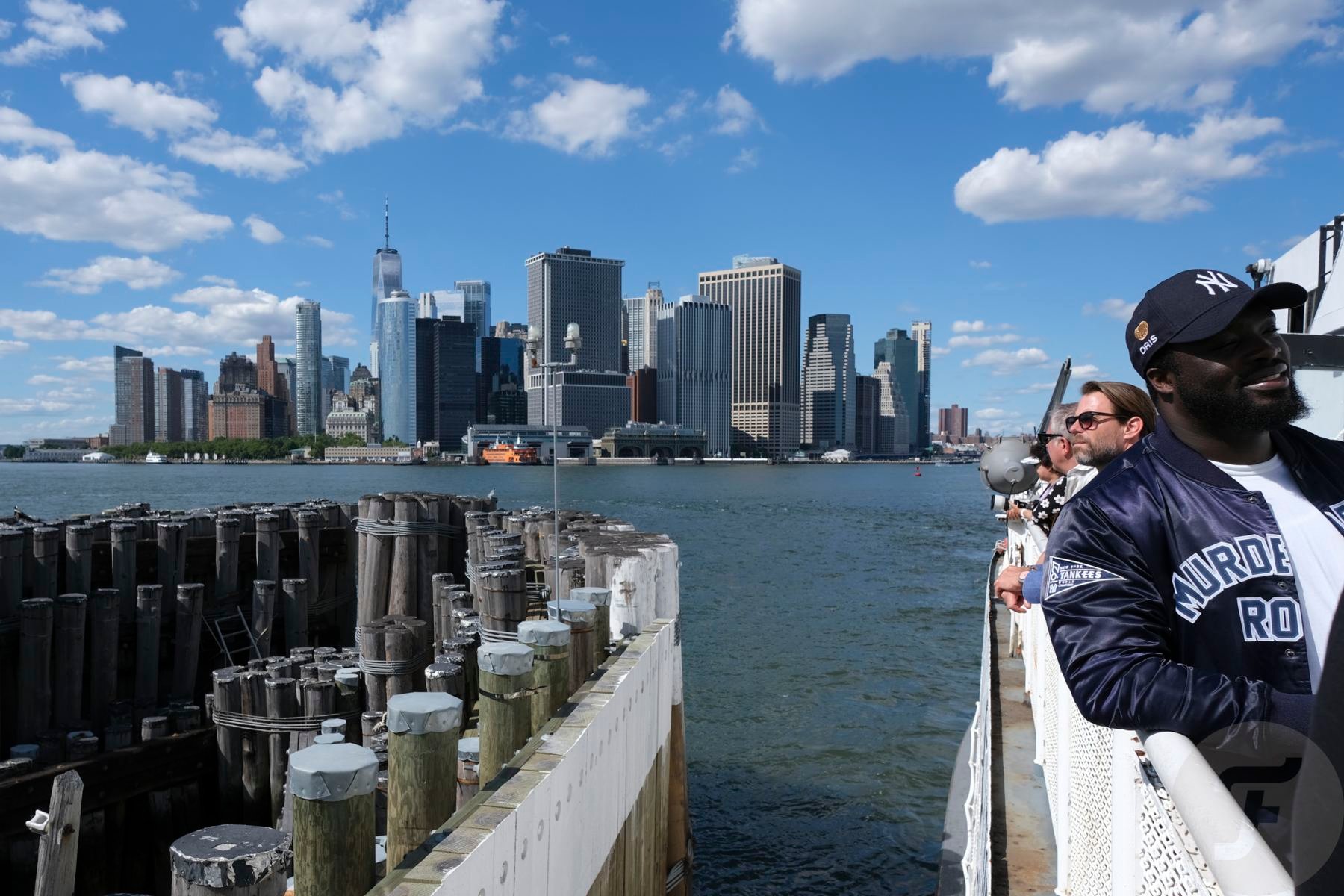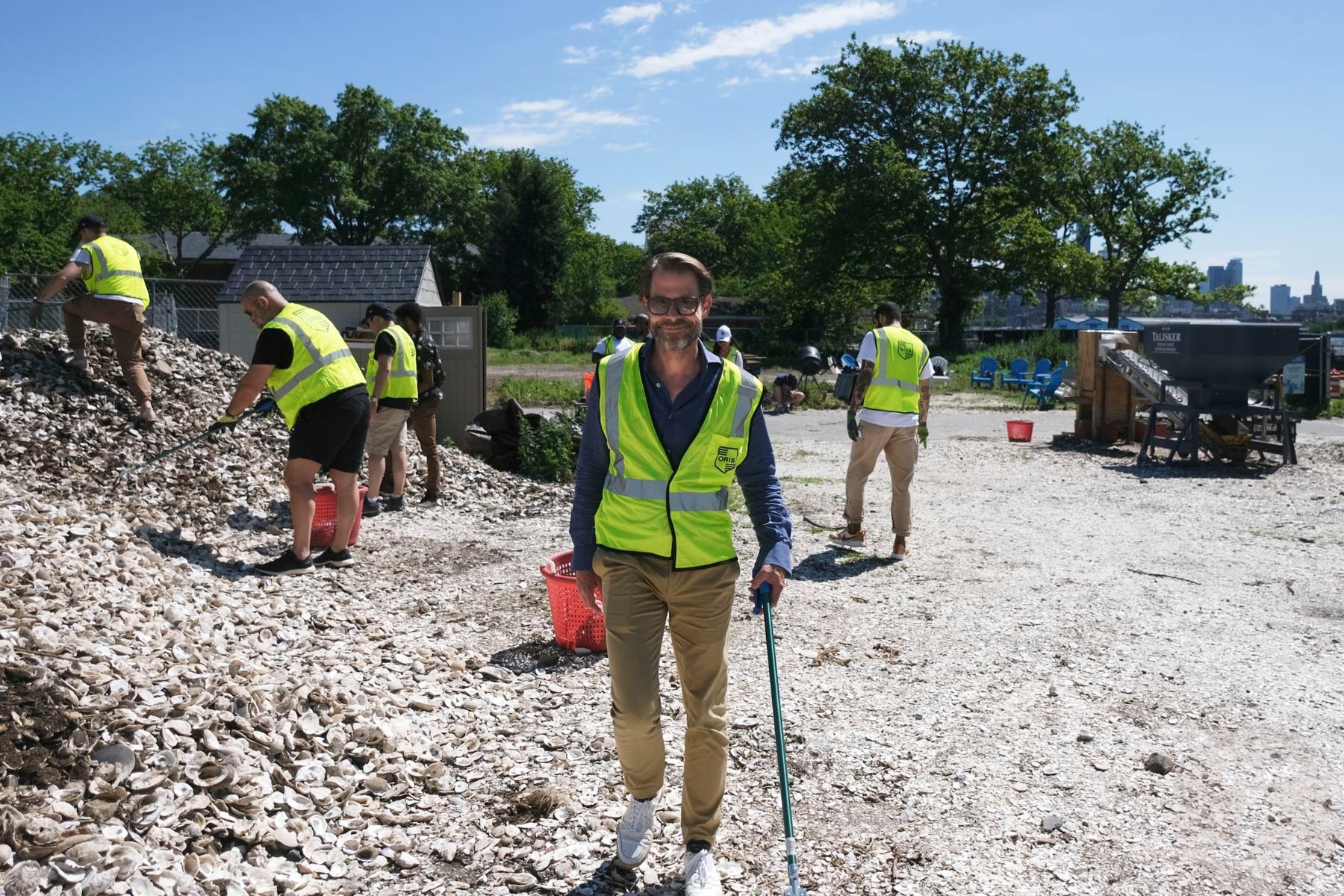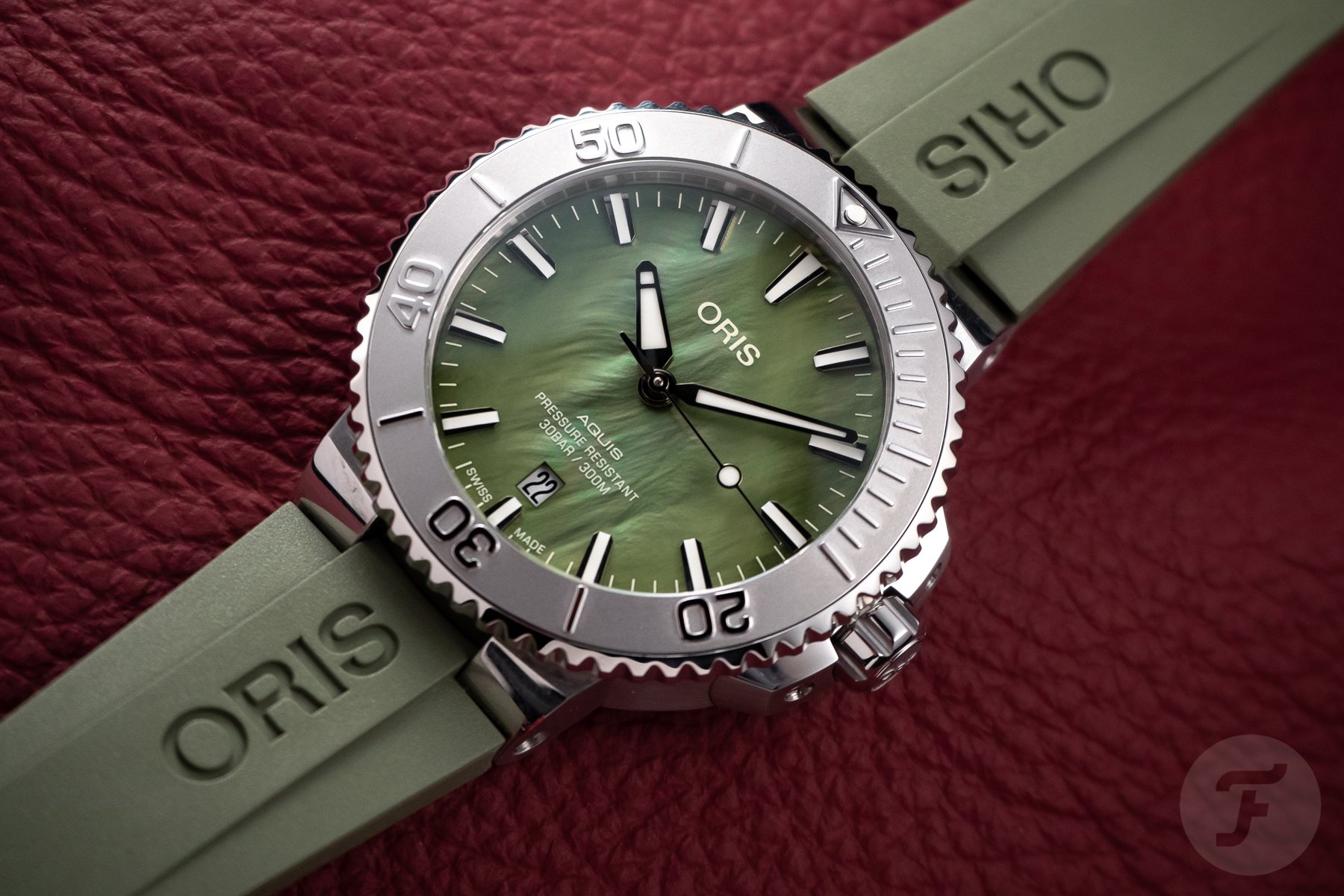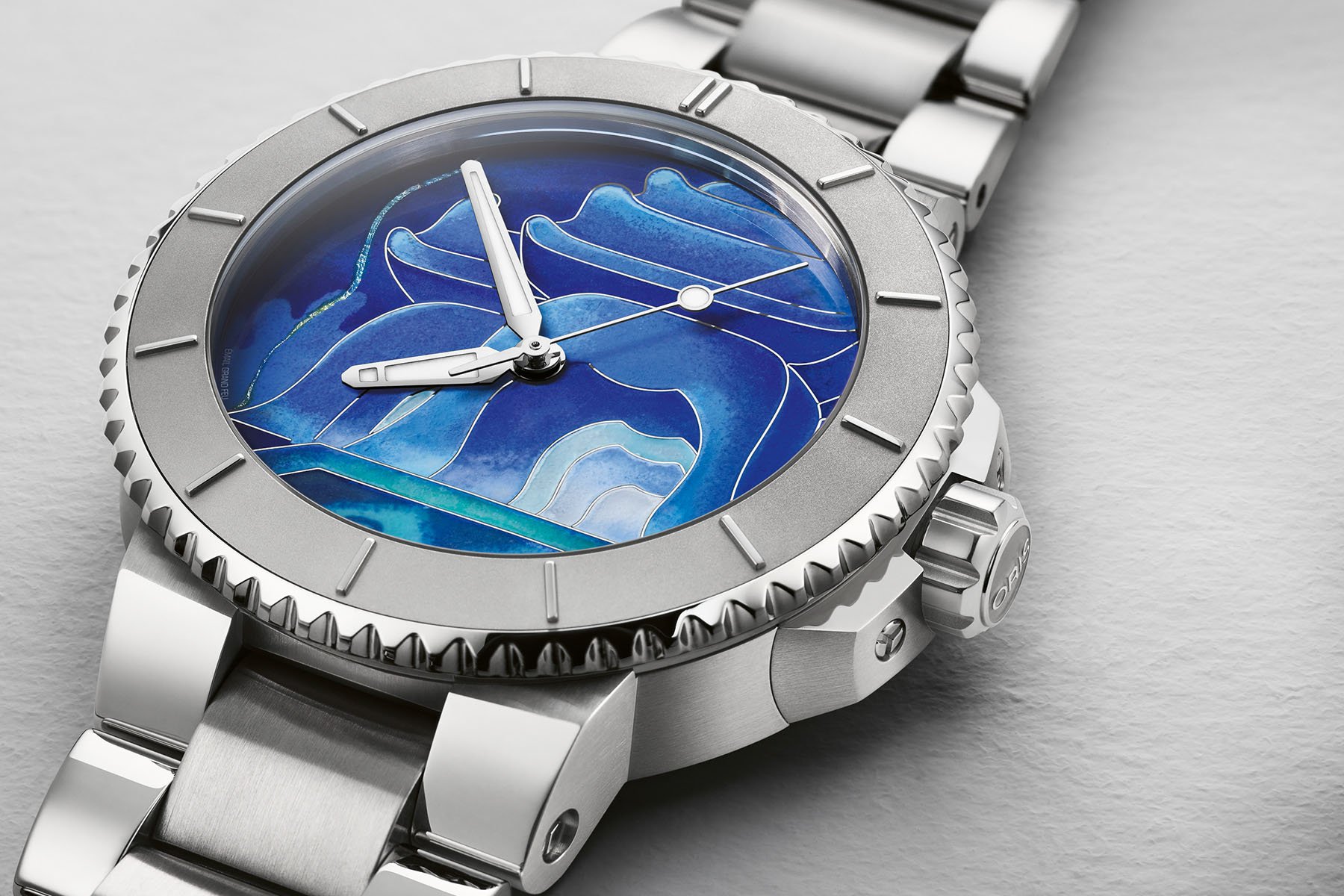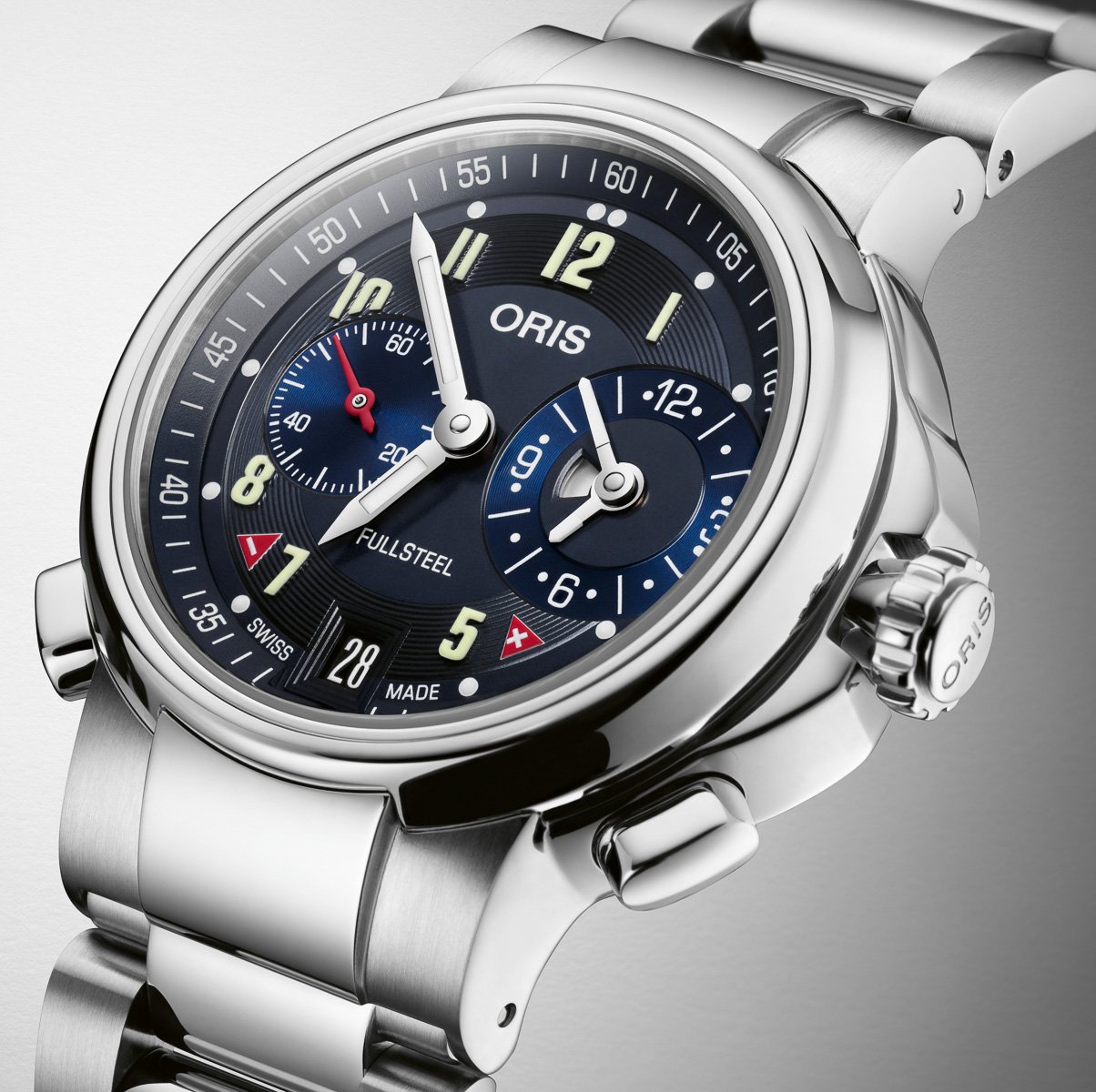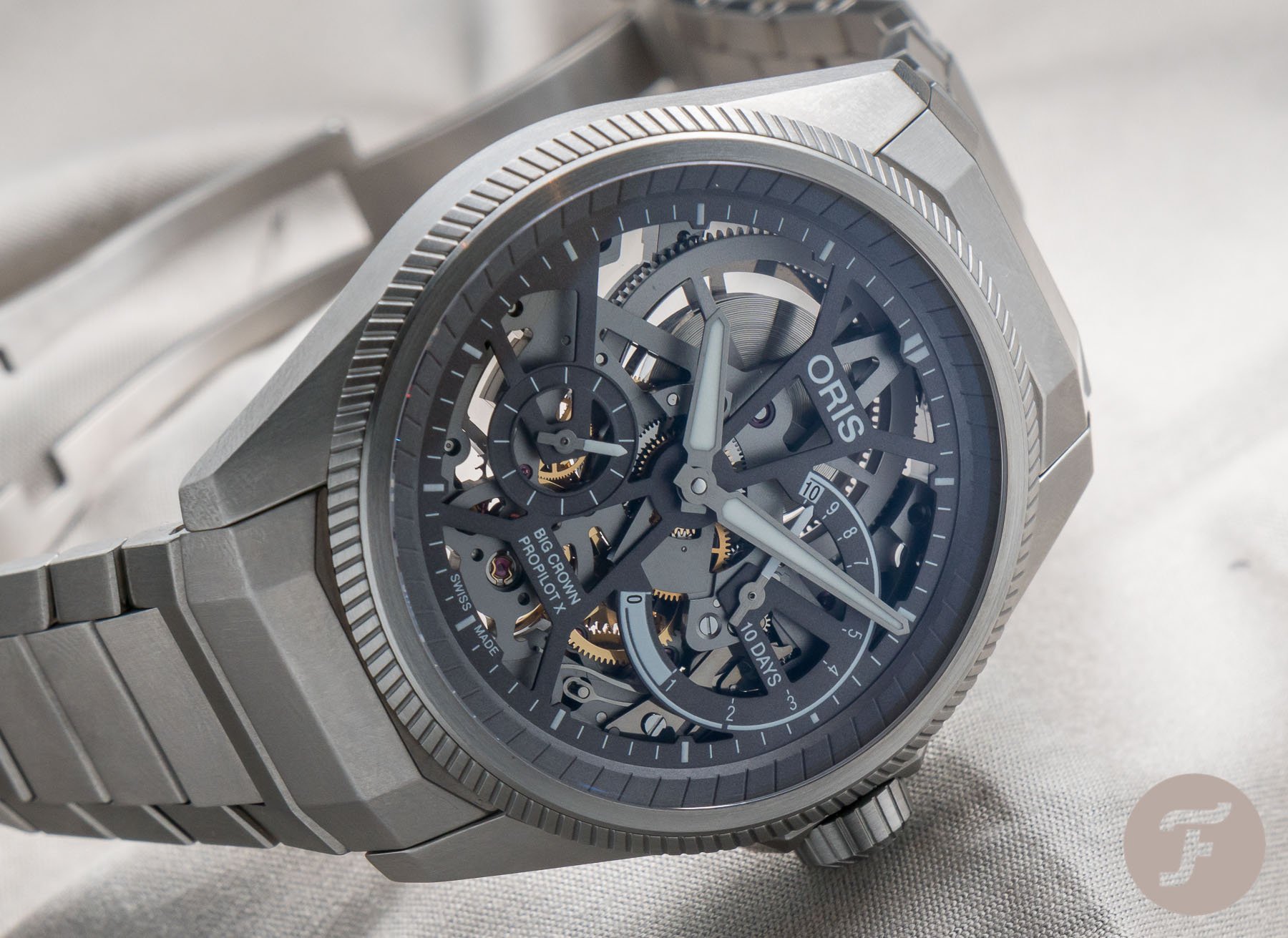Interview With Rolf Studer, Co-CEO Of Oris
Part of the schedule at Oris’s New York Harbor LE release event with Billion Oyster Project allowed for interaction with Rolf Studer, the co-CEO of Oris. He was gracious enough to sit down with me and talk about the brand, sustainability, and what it means to be a “citoyen”.
I sat down with Rolf Studer at the back of the Oris Airstream trailer that had been towed to the New York Harbor release event. What had been an RV has been converted into an intimate Oris showroom on wheels. There’s a small dinette at the back, existing seemingly for exactly this kind of interaction. Studer is a laid-back individual but full of intensity, like a mainspring that is eternally wound but feels no stress about the task it must perform. He sips his wine and answers my questions in stride, not displaying any fatigue, which he certainly has a right to. This Oris release has been a whirlwind. On top of that, Studer is still managing the team back in Switzerland, and I happen to be the third person interviewing him this afternoon. Yet, he’s all smiles. Studer truly loves what he does.
On Oris’s role in environmentalism
Thomas Stover: So, obviously, the New York Harbor watch is a very exciting release for Oris. What I found interesting is that, as far as I can tell, this is the first time Oris has done a lot of things regarding a collaboration. One is that you’ve made a watch with a new material for the dial, which I want to talk about later.
But secondly, you’ve partnered with an ecological foundation that maybe isn’t as easy to sell conceptually as some of the other sexier environmental causes, such as the Wadden Sea tidal flats with the Dat Watt limited edition, Lake Baikal, and the Barrier Reef. These are much easier concepts to sell to the public, I think. So, I’m curious to know how Oris perceives itself as an environmental activist or an influencer currently in what you’re doing, as well as what you’d like to do more of or differently in the future.
Rolf Studer: That’s a very good question. For us, sustainability is one of our three core values, and, let’s be honest, it’s out of necessity.
As I explained before, we always had to be very mindful with our resources because we were an independent, small company that had to fight against the other brands out there. And basically, the watch crisis killed our business model, which was [to make] an affordable, well-made timepiece for the average man.
So there was always a lot of rigor in dealing with things, a lot of thinking before things were done. Quite the opposites to that après moi le déluge, “after me” — what do you call it? — “the flood” that other brands left. And I think in this, I don’t know if “seriousness” is the right word, but within that responsible approach lies the roots of what we do. We started rather early to support projects with our dive watches that had an environmental impact long before others did.
And you grow. You grow in awareness and you also grow a network. I am very excited. This is maybe one of the things that makes me most proud about that whole thing — that now we are in a position to connect people. And you see it here, right? There are people talking to each other. Billion Oyster Project had screen time yesterday in the Yankee Stadium.
To leverage a message like that really gives me a lot of satisfaction. And now being climate neutral since last year and also looking at it from a methodical standpoint, it’s not just an emotion, right? It’s really fact-based now. I mentioned before these 15 tons of watches we create.* You know, I was at Watches And Wonders. I was on panels. With these custom materials, it’s okay. It’s all good. But we should be beyond the state of a compostable strap, right? How much of that material will be used?
Maybe there is a leading role [to be had] in the watch industry if these materials actually do something, but they don’t. So, to me, this is just talking about it, right? When we look at our emissions, we see that the biggest contributor is flights, so to come over here to such an event doesn’t really give me good feelings, right? I don’t like to do that.
(*During the New York Harbor Limited Edition release event, Rolf Studer talked about how measuring sustainability by the actual materials going into the watches that brands manufacture is negligible within the larger picture.)
Sustainability being more than just restricting
TS: I had a conversation with Josh* when he invited me out here. Fratello had just published the article on sustainability for Oris. And I was talking to Josh and said, “Well, you know, I don’t know how I’m working out in my head justifying a flight to New York for an event all about sustainability.”
But I guess what I’ve come to for myself is that we do the best that we can with what we’ve got. And at some point, the message is important enough to make certain sacrifices to get these ideas out and across to the public.
(*Josh Shanks, Oris’s director of marketing and communication for North America)
RS: The thing is, yes, sustainability. But when you get a bit more into detail, it is living in that triangle of ecological, social, and economical sustainability. So, as an employer, yeah, we feed families, right? We have responsibility. We have a responsibility towards them as much as we have it towards the environment. How do you do that, then? You have to live within the limitations of what we just discussed. But when you look at it with the understanding of the triangle, then that makes sense.
Talking about social sustainability, I think that’s very important. At Oris, we do workshops for our employees where everybody can contribute what they do personally to change for the better. And it’s very broad, right? Some people there, they like to ride a bicycle or motorbike. Okay. If that is their hobby, they should do it, right? But maybe do something else that’s good. And like that, we are not creating a religion or a doctrine as a company, but we are intrinsically motivating our team to change for the better and to develop a common understanding of what that means, also as free people who are free to make their own decision.
…to use that leverage that we have as a brand to talk to people and educate them and hopefully influence them is where I see our role in that whole game.
A watchmaker brought this old pen that he bought 30 years ago and he said, “Look, I keep my things. I don’t throw things away. This pen, I bought it 30 years ago. It was very expensive for me. At that time, I had a small salary. It will be with me for the rest of my life.” Someone else says, “I only use hard soap. I don’t use soap in plastic bottles anymore.” I brought an apple from our apple tree and said I try to teach my children to live with the seasons and to eat according to the seasons. And this really makes you think. I know so many examples, just because these people told them. From that, you grow an awareness and you also grow mutual spirit.
To come back to your question, where I think our influence is that we have leverage. It’s not the product. That is nonsense. “Recycled steel,” right? Okay. Now you make 98% recycled steel. Given that you make, I don’t know, five tons of watches. This is like two kilos, right? Plus, 70% of standard steel is recycled anyway. You know, when you go into detail, you find out what really makes sense. To apply that, then, and to use that leverage that we have as a brand to talk to people and educate them and hopefully influence them is where I see our role in that whole game.
TS: So, similar to what you’re doing with your community in the office, engaging your employees and your co-workers, you’re looking to inspire the conversations that are necessary among your clients and the enthusiasts that are looking at the watches.
RS: Absolutely. And we really do have a community as a brand, right? To be able now to see that we as a brand are able to bring these people to help clean up beaches, or places with a lot of trash, really makes me very proud. As a luxury company, these people join us and do that with us. They don’t expect us to champagne them anymore. They want to join our purpose. That gives me hope.
Unique dials for unique causes
TS: Going back to the watch at hand, then, the New York Harbor Limited Edition, you’ve now used a mother-of-pearl dial, which — correct me if I’m wrong — I think is a first for Oris, at least in recent times.
RS: Yes. We did mother-of-pearl dials a few years ago, but only in ladies’ watches.
TS: The smaller Aquis.
RS: Yeah.
TS: That’s another thing I want to talk with you about, but we’ll get to that. So you have mother-of-pearl and in a very striking color. I don’t think anyone else in the watch industry has done a green like that with mother-of-pearl. So it’s a very unique dial with a very unique cause attached to it. I think it’s been matched perfectly and you’ve done an excellent job of selling the cause along with a beautiful watch.
Previously, you did something similar with a very unique dial and unique cause with the Aquis Upcycle with the recycled plastic dials. And of course, no one is expecting you to recycle all the ocean plastic with a few thousand watch dials.
I’m curious now that it seems like Oris, at least with the Aquis line, is branching into new dial materials, colors, and textures. Is this the beginning of a new chapter of unique approaches and kind of playing with the Aquis more as a blank canvas for future projects? Can we expect more unique dial materials and colors?
RS: Well, I think we have a reputation for thinking out of the box, for being innovative, and for doing things others don’t do or haven’t thought of doing. So I think it’s a continuous path. Yes, obviously, working on that watch has shown us what can be done with mother-of-pearl, which is very interesting. The Clean Ocean Aquis is a good example of doing it differently and creating a conversation piece.
…that person who wears that watch and has that conversation starter on his wrist, maybe he feels a little bit more obliged not to do something or to talk to people about it and just raise awareness.
And you’re 100% right. The plastic that we use for these watches, that’s absolutely not the point. Maybe it’s two, three kilos. It does not matter. Let’s be honest. What matters is that someone wears a watch with a dial made out of recycled plastic. These few kilos, they don’t matter. But that person who wears that watch and has that conversation starter on his wrist, maybe he feels a little bit more obliged not to do something or to talk to people about it and just raise awareness.
Again, you know, leverage the message with people who can make a difference. In the end, that’s the core of it.
On Calibre 400 in environmental limited editions
TS: Obviously, your Aquis limited editions are a huge hit now. So, too, are the new 400 calibers that are finding their way into the entire catalog for the most part. Can we expect to start seeing limited editions with environmental organizations using Calibre 400? If you can say… I don’t want to pin you down.
RS: Certainly. You know that will certainly happen. So far, it was in limited editions for watch enthusiasts, such as the Chronos Limited Edition or Hodinkee Limited Edition, and then with the Monkey King [Aquis] with the cloisonne dial. So it was more from a watchmaking point of view, but they will come together eventually. That’s certain.
On the inclusivity of the brand
TS: The Monkey King brings up a good point. You mentioned that you had mother-of-pearl for the ladies’ watches previously, but as I go through the catalog, especially now, it seems like Oris is making a very strong point on inclusivity. So you have an ungendered catalog with watches that can be worn by just about anyone. Your hand models, a lot of the time, are people of color.
And then also with the Monkey King, you’ve introduced a pair of watches that have a very strong association with Chinese culture, but without fetishizing it. I think a lot of watch companies and other luxury-goods industries miss the mark on that, where they try to go with an Asian theme and they just end up fetishizing. So I’d like for you to speak a little bit about what Oris sees as its market segment regarding who the brand is trying to reach and how perhaps you’d like that to shift as the company grows and gets more awareness in the general community.
RS: We always have been a brand for the watch enthusiast. People who know about watches, they always liked us. And that is still the case. A reason why we grew as we did over the last few years is exactly because of those enthusiasts. Because what was a nerdy hobby ten, fifteen years ago — watch collecting — suddenly has become a cool lifestyle on Facebook, Instagram, or TikTok. So these are the people that are very close to our hearts and that we make our products for. But also, we want to reach the average guy who likes watches. A person who wants to have a well-made, well-thought-out, well-designed Swiss timepiece with values that are of a clear message and a product that is reachable.
Within the watch industry, we are the citoyen, the citizen. We are the enlightened person. We are the product of the age of enlightenment, as a watch brand. We don’t hold court. We don’t expect people to bow. We are equal. We want to be on an eye-to-eye level with our audience. And that is also our customer.
Our customer is somebody who likes a well-made watch but also has to afford it himself. To spend three, four, five thousand dollars or Swiss francs on a watch, it is a lot of money. Personally, I have a lot of respect for people who do that with our products because I always have to think when I spend such an amount of money. And often, we tend to forget. “Yeah, fifteen grand. Oh, that’s cheap,” or “that’s a good price for that piece”. Man, it’s fifteen grand. Other people buy a car. Sometimes you must make sure not to lose perspective.
That’s our message. And our customer is the citoyen at the end. The citizen, the thinking person working for his money and being happy to spend it within reason, if that makes sense.
On various watch complications
TS: Yeah. It’s something I’ve definitely remarked on in what I’m seeing from the outside, looking at the website, and interacting with the brand. It seems like Oris is situated as a company to make fun and unique watches for ordinary people.
When you look at Oris compared to other watch companies in the same price segment, there is a distinct lack of complications for the most part. And I realize that certain complications definitely come with a higher price tag as well, but for the most part, Oris doesn’t do too much in the way of chronographs or GMT functions and the like. I was wondering if that is a conscious choice to keep options broad for the consumer, or if there’s another reason that Oris focuses primarily on time-and-date watches and doesn’t branch out too much into other complications.
RS: Well, I’m not sure if I 100% agree. Of course, we have more than day/date models. They are the core of our collection in Divers 65, Aquis, and ProPilot. But we are the company that created a depth gauge and we make the Altimeter. We have a 10-day, hand-winding movement with a non-linear power reserve indication.
We launched a world timer in 1997. So I think there are a number of complications that are very interesting, but also, things must make sense, right? We don’t do a complication just for the sake of it. We want it to make sense in its context. And maybe sometimes, you’re even thinking too hard. The simple GMT. Yes, that’s good. We have it in the collection, but our customers don’t react so much to that. They react to more special things like depth gauges, altimeters, Calibre 115, and now Calibre 400. So I don’t think there is an active choice in not doing complications.
Looking forward, looking back
TS: Regarding the world timer that you just re-released, the Full Steel. It seems like at this snapshot of what the company is doing right now, there’s a really fun juxtaposition of bringing in retro design with the Full Steel, and then releasing cutting-edge design and material use with the titanium ProPilot X. I’m curious to what extent Oris is conscious of and wanting to maintain that balance as it moves forward, as far as pushing its design language into the next century, while also holding onto the designs that we recognize historically as Oris.
RS: Well, with each family, we try to develop their own language. I think we have reached a certain level of depth within these families. And, as the citoyen is, we are just curious people, right?
So we like to explore, we like to push, and also, we don’t take the whole thing totally seriously. In the end, it’s a watch, and our company’s purpose is to make people smile. We want to cheer people up, otherwise, you don’t need our watches. That guides us and that steers us. That’s how we develop these things and try to offer something that, yeah, makes our customers smile.
TS: Well, that’s all my questions. Thank you so much.
RS: Thank you.
For more information about Oris, visit the brand’s official website.
You can find me on Instagram @WatchingThomas

